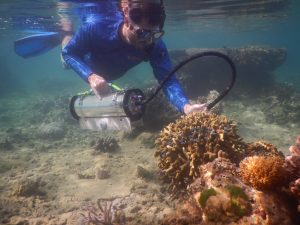
A collaboration of efforts from five organizations focuses on using novel technology in the field to aid in coral restoration practices across the globe. The efforts have resulted in two grant-funded projects totaling more than $2 million.
The researchers coordinating efforts on these projects include Dr. Kenneth Hoadley with The University of Alabama and Dauphin Island Sea Lab, Dr. Mark Warner with the University of Delaware, Dr. Erinn Muller with Mote Marine Laboratory, Drs. Bastian Bentlage and Laurie Raymundo with the University of Guam, and Victor Bonito with Reef Explorer Fiji – a community-based conservation NGO in Viti Levu, Fiji.
Understanding and addressing the key drivers of climate change continues to be the only long-term solution for reversing the massive declines in coral reef ecosystems worldwide. One method to increase the coral population is transplanting corals with high thermal tolerance in areas hit hard by bleaching. However, determining what specific coral colonies or even which species are thermally tolerant is labor-intensive and time-consuming. Environmental factors also constrain restoration efforts and differ across locations.
“Many active restoration sites are located in developing countries where significant resources for conservation activity are not available,” said Hoadley, an assistant professor in UA’s Department of Biological Sciences. “New tools that provide low-cost and scalable solutions for predicting desirable traits, such as thermal tolerance, in novel coral colonies are needed.”
The two projects funded by the 2022 Coral Research and Development Accelerator Platform, or CORDAP, and NOAA’s Ruth Gates Coral Restoration and Innovation Grant will allow researchers to test a tool created to determine the thermal tolerance of a species of coral in the field as opposed to in the laboratory. The goal of the tool is to determine coral thermal tolerance rapidly and non-destructively and then incorporate non-destructive bleaching prediction into ongoing restoration efforts.
CORDAP awarded the team $1.5 million over three years to test the novel bio-optical tool on managed reef systems around Fiji and Guam. NOAA’s three-year, $615,000 grant allows them to assess novel coral colonies within a nursery system across the Florida Keys.
“Together, the two projects provide an ideal platform for robust assessment of our predictive tool and its downstream efficacy within different environmental conditions, socioeconomic constraints, conservation and restoration methodologies,” said Hoadley.
For the projects, the researchers will run a series of thermal bleaching experiments and capture data on the performance of individual coral colonies. They will also collect data using the submersible algal phenotyping, or SAP, fluorometer, which was created by Hoadley and Grant Lockridge at DISL. This data will be used to construct a predictive model using machine learning algorithms.
“Novel colonies can then be selected quickly and non-destructively using just our SAP fluorometer and the resulting predictive model to find more colonies that have a high thermal tolerance,” Hoadley said. “Model development, testing and long-term monitoring of selected colonies are all incorporated into our project plan and will help us determine the efficacy and constraints of the technique.”
More on the Collaborators:
Dr. Kenneth Hoadley (Assistant Professor, University of Alabama and Dauphin Island Sea Lab) – Lead PI for both projects. Instrument development and analytical pipeline for converting bio-optical data into predictive bleaching assessment. Expertise in algal photobiology.
Dr. Mark Warner (Professor, School of Marine Science and Policy, University of Delaware) – Co-PI on both projects. Expertise in photobiology of marine algae. Pioneered the use of chlorophyll-a fluorescence techniques for assessing coral response to thermal stress. Expertise in photobiology and first to identify the initial mechanics of thermal damage within coral photo-symbionts which leads to the bleaching phenotype. Expertise in symbiont genetics and coral symbioses.
Victor Bonito (Reef Explorer Fiji) – Co-PI on CORDAP award. Pioneered coral conservation on the southern coast of Veti Levu, Fiji (Coral Coast). Using community-based conservation, he has worked with local communities to sustainably minimize reef pressures such as overfishing through the implementing several Marine Protected Areas (MPAs) on the Coral Coast of Fiji. Once MPAs are established, he then actively restores these areas by selecting coral colonies, collecting fragments from these colonies, and placing them into underwater nurseries. Once the nursery corals have grown to an adequate size, they are cemented back into these MPAs. Here, the central focus is to eventually increase the breeding populations of thermally tolerant corals. Victor was also recognized for his conservation efforts in Fiji as the recipient of the 2023 Coral Reef Conservation Award from the International Coral Reef Society.
Dr. Laurie Raymundo (Professor, University of Guam) – Co-PI on CORDAP award. Lead for coral restoration programs run through the University of Guam and the Director of the University of Guam Marine Laboratory.
Dr. Bastian Bentlage (Associate Professor, University of Guam) – Co-PI on CORDAP award. Expertise in molecular biology, symbioses, and ecology of reef corals found throughout Guam.
Dr. Erinn Muller (Mote Marine Labs) – Co-PI on NOAA award. Associate Vice President for Research and Program manager for Coral Health and disease at Mote marine labs in Florida. Mote is the largest restoration facility in the Florida Keys, transplanting 30,000 coral fragments each year. They have state of the art facilities for experimental testing and coral nurseries within the Florida Keys which are critical to this project. Erinn’s expertise is in coral host ecology, physiology, restoration and out-planting techniques.
Contact:
Angela Levins, Public Relations Director, Dauphin Island Sea Lab, alevins@disl.edu
Brock Parker, Multimedia Specialist and Writer, Alabama Water Institute, brockparker@ua.edu
